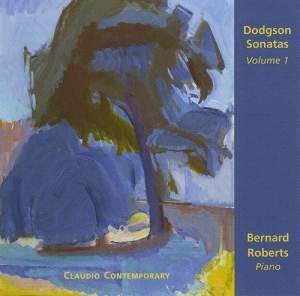An excellent addition to anyone’s collection of Stephen Dodgson’s music.
 Stephen DODGSON (1924-2013)
Stephen DODGSON (1924-2013)
Piano Sonatas Volume 1
Piano Sonata No. 2 (1975) [18.35]
Piano Sonata No. 4 (1987) [20.59]
Piano Sonata No. 5 (1992) [19.33]
Bernard Roberts (piano)
rec. 1994
CLAUDIO RECORDS CC4431-2 [59:10]
The problem with this disc is that it is not so much a reissue, but more of a re-entry into the new releases list, in order to benefit from the recent renewed interest in the composer and his music, indeed back in 2000 Rob Barnett reviewed both this disc and its companion (CC4941-2) in these pages. These were amongst the earliest surveys of Dodgson’s music, since when we have had some excellent recordings released, especially from Dutton and Naxos which have somewhat eclipsed these recordings. It is certainly not the first time that a record company has rereleased a disc to take advantage of current interest and I am sure that it won’t be the last.
The three sonatas featured on this disc show that Stephen Dodgson was more than a competent composer of piano music, with each providing its own particular challenges for the pianist, and that these works have for far too long been hidden in the shadows of his works for guitar, the instrument that he is most remembered for composing for. The first of the sonatas on this disc, No. 2, is the only one here to be assigned a key, that of C Major, and it opens calmly with a peaceful melody, only for this to be interrupted by spikey rippling effects that seem at odds with the opening theme. The rest of the movement then develops in to a more forceful structure whilst still returning to and referring to the original theme. Wilfred Mellers’ excellent booklet notes here refer to Aaron Copland’s Piano Sonata of 1940 and suggests a kinship between that work and this Sonata; this is more evident in the Second Movement especially in the way that the movement opens and then develops the quite powerful material.
The Sonata No. 4 begins percussively and has little to do with sonata structure, or so it seems; here I would agree with Rob in that it too reminds me of Poulenc, something which is further reinforced as the Sonata progresses. I am struck by the way that Dodgson moves from one short melody to another, seemingly without a break for thought; indeed this is the way it is played also, with hardly a breath between the end of one movement and the start of the next. I particularly like the concluding movement of this Sonata with its slow melodic material being, once again, interspersed with a rippling motif in the right hand.
The final work on this disc is the Sonata No. 5 of 1992, which was composed for the present pianist’s sixtieth birthday. It starts slowly, but gradually builds up in intensity. Its second movement is marked by its diverse primary and secondary thematic material and the dissonance that runs through it (and, indeed, much of Dodson’s piano music). The third movement is the closest that the composer comes to writing a true slow movement, with its slow progression and development heightening the intensity through the strength whith which the keys are played rather than in tempo. In contrast the final movement begins with a real flourish before rushing headlong to the works conclusion.
 This music is largely melodic and tonal, although Dodgson’s use of dissonance does make this music sound modern – it certainly doesn’t belong to the English pastoral tradition. However, I found this disc to be rewarding and a fine addition to my growing catalogue of Stephen Dodgson discs. I will eagerly be looking out for Volume 2. To answer a question Rob poses, as to whether there will be any further volumes – well, Dodgson did compose a Sonata No. 7 in 2003, some nine years after he had completed his sixth which appears on Volume 2 of this series, but I am not sure if Bernard Roberts ever recorded it, hopefully someone else will get around to it.
This music is largely melodic and tonal, although Dodgson’s use of dissonance does make this music sound modern – it certainly doesn’t belong to the English pastoral tradition. However, I found this disc to be rewarding and a fine addition to my growing catalogue of Stephen Dodgson discs. I will eagerly be looking out for Volume 2. To answer a question Rob poses, as to whether there will be any further volumes – well, Dodgson did compose a Sonata No. 7 in 2003, some nine years after he had completed his sixth which appears on Volume 2 of this series, but I am not sure if Bernard Roberts ever recorded it, hopefully someone else will get around to it.
Stuart Sillitoe
MusicWeb International
http://www.musicweb-international.com/classrev/2019/Mar/Dodgson_piano_v1_CC44312.htm








